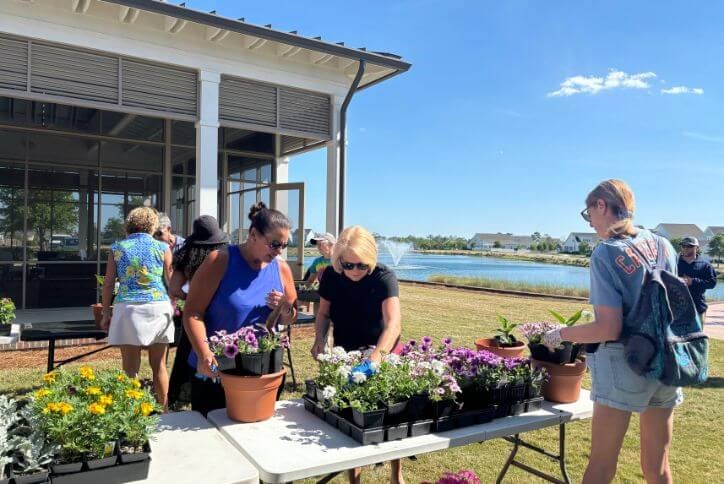
04 June . 2024
Bringing Nature Home: Area Garden Shops Go Native
Tis the season – for all-things-gardening. For avid flower, vegetable and kitchen gardeners, there are few times of year as satisfying as the spring and summer months that deliver such bounty and long days to enjoy it.
Still, the decidedly shifting environmental trend toward hotter and drier days introduces new considerations into even the most experienced and confident gardeners among us. To combat this reality, or perhaps more to the point: to adapt, more gardeners and garden-supply shops are shifting to native plants.
Native simply means a plant that is indigenous, occurs naturally and has evolved and adapted to a region, ecosystem or habitat. So, something that is native to the Raleigh/Durham area, is not necessarily native to the Cape Fear Region. The advantage of shifting one’s garden to native species is that these plants have adapted to local soil, climate, even pest conditions. As a result, they require less supplemental watering, and once established, do not need pesticides or fertilizers – better for the environment and saving time and money.
Importantly, “native” needn’t mean messy or untended. Far from it! Native species will nicely contribute to an existing landscape or flower bed with a delightful added benefit: welcoming native pollinators. To see the marriage of plant and pollinator is to recognize the small role one can play in restoring a balance in nature, regardless of whether it’s an entire backyard, or just a balcony.
New Hanover County’s Arboretum and the North Carolina Extension Service offer tremendous resources to get started. The Arboretum offers an extensive list of native plants and features a native plant garden to see various recommended species IRL. Their crew of (more than 300!) master gardeners are also available and eager to share their knowledge at their daily plant clinics.

Local garden shops are also beginning to set up native plant sections and displays to encourage the practice and reduce introduction of more invasive species.
The Garden Shop on Moss, part of Wilmington’s Cargo District, offers a great display, with some plants already bearing caterpillars and the promise of butterflies for no extra charge! It’s a lovely pocket garden shop adjacent to the equally charming Brighter Days Coffee.

Nearby Farmers Supply, on Oleander Drive, a long-time staple in Wilmington, is another garden shop that offers an abundant selection. Here, shopkeepers can also advise on vegetable varieties that are more resilient to today’s environmental demands.

Blooms and Branches, further down on Oleander toward Wrightsville Beach, also offers native plants, as well as trees and shrubs, and advice for the new-to-native gardener.

More distant destinations, but destinations they are, would be Shelton Herb Farm and Pender Pines. Shelton Herb Farm, located in Leland, offers as the name suggests a broad selection of herbs, both culinary and medicinal – and so much more. Find fruit trees and shrubs; vegetable plants; and native, pollinator-friendly specimens. It’s a beautiful garden itself, with acres of well-tended fields that also host workshops and demonstrations, farm tours and special events. You will likely encounter their harvest at any one of several local farmers markets throughout the year.

Pender Pines is well north of Wilmington, in Hampstead. This vast garden shop goes on and on and on: in the front is a beautifully landscaped pond; in the waaay back, you’ll find emus and llamas and goats; inside are spectacular parrots and throughout are all the ingredients for gardening in the coastal south. Bring the whole family, Pender Pines almost feels like an amusement park for garden enthusiasts.

On the way out to Hampstead, consider stopping at Carolina Girl, an outdoor flower market that doesn’t necessarily specialize in native species, but offers a tremendous selection of summer color and verdant greens. Stone Garden is another stop that delivers a tremendous selection of hardscape materials, from paving and stones, to benches, fountains and birdbaths. It’s landscaped like a little pocket park.

And, finally, having nurtured a garden to welcome the birds, consider making Wild Bird & Garden a new and regular errand. Located in mid-town, Wild Bird’s will make sure to advise on what’s migrating when so the bird feeders are well stocked with safflower for goldfinches, black-oiled sunflower seeds for cardinals and suet for woodpeckers. HINT: the shelled medley appeals to a great variety of songbirds all year long.

With the birdsong greeting you every time you step outside, you’re bound to enjoy one of the many benefits of gardening in general. In fact, gardeners may well be among the happiest people on earth, as study after study conclude that digging in the dirt, listening to the sounds of nature, engaging with the natural world, all while absorbing sunlight is good for the heart, mind, body and soul.
FINALLY: Wish to read more? Check out any of Doug Tallemy’s titles. His most recent, Nature’s Best Hope, is an inspiring read that will surely awaken a reconsideration of what makes a garden most beautiful.
